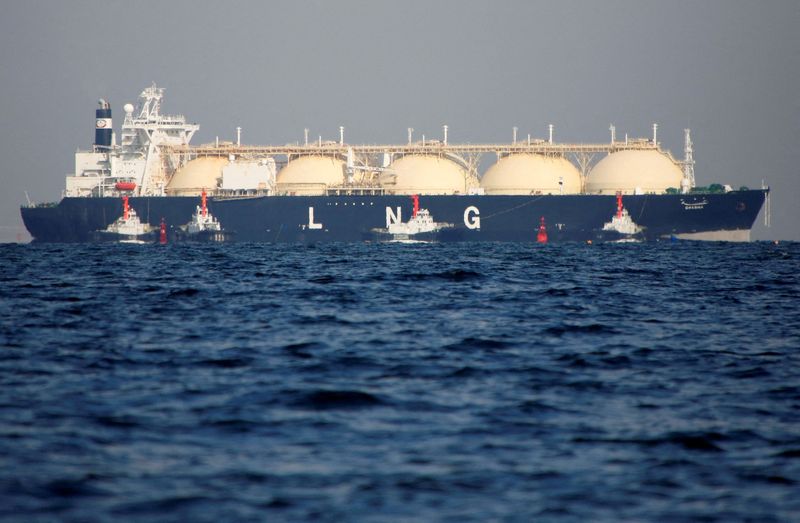By Joyce Lee and Florence Tan
DAEGU, South Korea (Reuters) -Global liquefied natural gas (LNG) buyers and sellers are bracing for more uncertainty over Russian supplies and an unclear demand outlook from Europe and top importer China in the run-up to the peak winter season, industry executives said.
Western sanctions on Russia due to the Ukraine invasion have disrupted Russian gas supply to Europe, sending global gas prices to all-time highs earlier this year and raising energy security concerns. Moscow calls its action a special military operation.
In addition to unpredictable weather, it remains unclear whether there will be further cuts in Russian supplies to Europe, the executives said. Also uncertain is whether Europe can build new LNG import infrastructure in time to replace massive Russian volumes, they added.
One more question is when China will lift its COVID restrictions, which have slashed imports in the first five months of this year.
"We have massive uncertainty over what will happen next," Steve Hill, executive vice president at Shell (LON:RDSa), said at the World Gas Conference.
"If we convert the Russian pipeline gas volume into Europe in 2021 into an LNG equivalent, and add on the LNG volumes delivered into Europe in 2021, that's 200 million tonnes of LNG equivalent. That's half the size of the current (global) LNG industry."
Infrastructure constraints that have emerged as gas flows change from west to east, rather than east to west, made it "more complicated than we first thought", he added.
Peder Bjorland, vice president natural gas marketing and trading at Equinor, said the changing flows have created a "strange market" where some countries in Europe such as Britain are oversupplied, but there is no infrastructure to move the gas to demand centres like Germany.
That has created a wide price gap between the British National Balancing Point and Dutch wholesale gas prices that could incentivise infrastructure investments to reduce bottlenecks, the executives said. But that infrastructure would take time to build, they added.
Germany is building an LNG receiving terminal and has contracted floating storage and regasification units.
"It's a race against time. We believe that the regas facilities will probably be up and running before the end of winter, but not perhaps by the start of winter. So that's a very delicate balance," said Michael Stoppard, global gas strategy lead at S&P Global (NYSE:SPGI) Commodity Insights.
A severe winter in the northern hemisphere could also spark competition between Europe and Asia for LNG and push prices higher, the executives said.
"As we get into the winter ... markets like Asia really start to compete for those cargoes," Anatol Feygin, executive vice president at Cheniere Energy (NYSE:LNG), said.
However, an executive with a Chinese gas importer said buyers were likely to enter this winter more prepared than last year, as European countries such as Germany and Italy have required minimum stock levels.
Buyers are increasing stockpiles ahead of winter, underpinning Asian spot LNG prices at nearly three times their May 2021 levels, unusually high for low-demand season in the second quarter.
"It's not as pessimistic this year, as everyone is preparing for winter," said the executive who declined to be named due to company policy.

Woodside (OTC:WOPEY) Energy Group's Chief Executive Meg O'Neill said she expects LNG prices to remain elevated for next year as the market adjusts to supply disruptions.
Market uncertainties and price volatility have already driven buyers in Asia and Europe to seek long-term supplies.